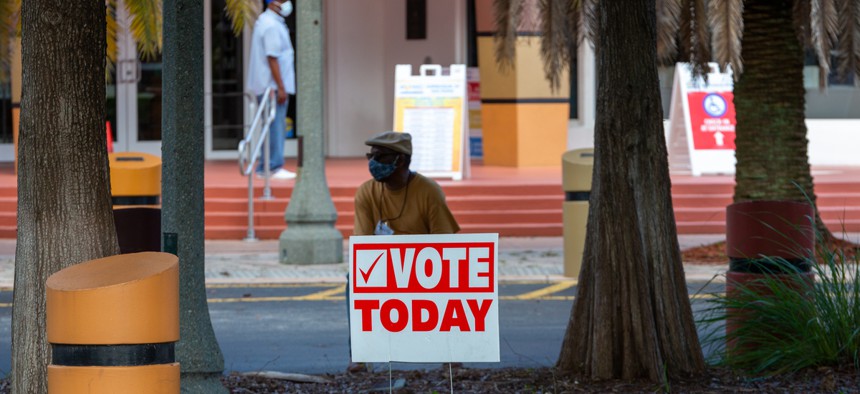Connecting state and local government leaders
After Mike Bloomberg raised $16 million to help people with criminal records vote in the state, some officials said the billionaire is “buying votes” for Joe Biden.
Florida Attorney General Ashley Moody this week called for an investigation into efforts to pay off the debts of people with felony criminal convictions in the state so that they can vote in the upcoming election, a push that came after billionaire Mike Bloomberg announced that he had fundraised $16 million for the Florida Rights Restoration Coalition.
In total, the group has raised over $21 million to help pay off the court fines, fees, and restitution owed by people with criminal records, much of it thanks to the donations of high profile celebrities like Bloomberg, Michael Jordan, LeBron James, John Legend, and Leonardo DiCaprio.
In 2018, Florida residents passed Amendment 4, a proposal that would have given most people with felony criminal records the right to vote after their sentences were finished. A law passed by the Republican-led legislature last year classifies fines, fees, and restitution as part of a sentence and requires these debts to be paid off before a person can legally vote. Advocates believe that restriction could affect as many as 770,000 people Amendment 4 was expected to re-enfranchise.
Moody, a Republican, said she was reviewing the fundraising effort at the request of Florida Gov. Ron DeSantis, also a Republican. In a letter written to the Tampa office of the FBI and the Florida Department of Law Enforcement, a statewide investigative agency, Moody claimed that Bloomberg might be in violation of state and federal election laws that prohibit bribes in exchange for votes.
Several legal scholars countered that Moody’s statement that Bloomberg might be buying votes is at odds with the state’s argument that requiring people with criminal records to pay off debts before they can vote does not constitute a poll tax.
A spokesperson for Bloomberg called the investigation a “transparent political ploy [that] is just the latest example of Republicans attempting to keep Floridians disenfranchised.”
Moody cited a state statute that makes it illegal to "directly or indirectly give or promise anything of value to another intending thereby to buy that person's or another's vote or to corruptly influence that person or another in casting his or her vote."
Her letter also references a Bloomberg memo published by The Washington Post in which Bloomberg staffers wrote that “to win Florida we will need to persuade, motivate and add new votes to the Biden column.” They continued on to note that they had “identified a significant vote share that requires a nominal investment … the data shows that in Florida, Black voters are a unique universe unlike any other voting bloc, where the Democratic support rate tends to be 90%-95%.”
Black people with criminal records are disproportionately represented among those who have outstanding fines and fees preventing them from voting. More than four out of five Black Floridians with criminal records have court debts.
Elaborating on her reasons for the request for an investigation on Fox News, Moody said that the memo was concerning. "When you look at the memo and what was alleged, when you hear words like we need to get this done, investing money to targeted particular group of voters that may be predisposed to vote a certain way, that raises concerns that you are directly influencing or even indirectly giving money to persuade votes to go a certain way," Moody said.
Desmond Meade, the director of the Florida Rights Restoration Coalition rejected the idea that his group was fundraising as a means to increase the number of Democratic voters in the state. The organization never asks about a person’s political preference when they apply for financial assistance, he said. “Different people may give for different reasons, but we are in this for one reason, and that reason is to place people over politics,” Meade told The Washington Post. “We are concerned with people from all walks of life, from all sorts of politics.”
The money raised by the Florida Rights Restoration Coalition will go towards paying off the debts of people who are already registered to vote and owe $1,500 or less. A key challenge in their efforts will be identifying who exactly fits into this category, as Florida has no centralized database keeping track of how much each person with a criminal record still owes the state.
Julie Ebenstein, a senior staff attorney for the ACLU's Voting Rights Project who worked on lawsuits challenging the constitutionality of the law requiring people to pay off debts before they can vote, said that the state’s response to the fundraising is telling. “Florida created an unconstitutional system that prohibits people from voting until their debts are paid,” she wrote in an emailed statement. “Now the state is objecting to those debts being paid. The state seems intent on preventing voting, rather than collecting payment.”
Emma Coleman is the assistant editor for Route Fifty.

NEXT STORY: Court Orders Census to Continue Counting People Past Trump Administration's Sept. 30 Deadline




